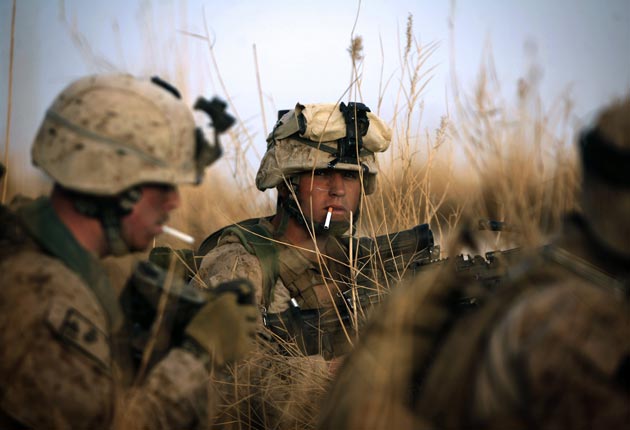Civilians killed as Operation Moshtarak tightens screw
Fierce battles mark third day of Nato assault on Marjah / Rocket system suspended as inquiry launched into accident

US, British and Afghan forces claimed they made steady inroads into the last big Taliban stronghold in central Helmand yesterday but their mission was clouded by the deaths of 12 civilians in a Nato missile strike.
The victims, 10 of them from one family, were killed when two missiles fired by US forces missed a compound being used by insurgents hitting a nearby building where they had taken shelter from the fighting.
Earlier, fierce battles erupted on the second full day of Nato's assault on Marjah, with US Marines comparing the fighting to that encountered in the battle for the Iraqi city of Fallujah in 2004.
The civilian deaths took place in the Nad-e-Ali district. It was unclear whether militant fighters were firing at American or UK troops when the rockets were launched. The missiles overshot their target by about 1,000ft. In an indication of how damaging even a comparatively small number of civilian casualties would be, the US commander General Stanley McChrystal was swift to issue an apology and order an inquiry. General McChrystal's reinvigorated counter-insurgency campaign is supposed to place the emphasis on protecting communities rather than killing militants. "It is regrettable that in the course of our efforts, innocent lives were lost." he said. "We extend our heartfelt sympathies and will ensure we do all we can to avoid future incidents."
The Afghan President, Hamid Karzai, had stressed before the start of Operation Moshtarak (meaning "Together" in Dari) that Nato forces must do everything possible to avoid civilian casualties. It is believed immediate compensation payments will be made to the bereaved families. The use of the High Mobility Artillery Rocket System, responsible for the deaths, has been suspended while a review takes place. Western military officials have accused the Taliban of deliberately seeking to carry out attacks using proximity to civilians as cover.
In London, Major General Gordon Messenger, a British military spokesman, said that British forces had so far fired just one Hellfire missile and no artillery rounds, insisting the welfare of the local people has been of paramount importance in carrying out the mission.
Meanwhile, a British soldier killed in the operation was named yesterday as Lance Sergeant Dave Greenhalgh, of the Grenadier Guards. He was killed by a roadside bomb while clearing a route from the provincial capital, Lashkar Gah.
According to Nato about 20 Taliban fighters have died and 11 have been captured, and the vast majority of the thousands of militants in the area appear to have disappeared after the widespread publicising of the operation by Nato.
US Marine commander, Brigadier General Larry Nicholson, said: "It will probably be 30 days of clearing [Marjah], but that doesn't necessarily mean an intense gun battle. The fire we just took reflects how I think this will go – small pockets of sporadic fighting by small groups of individuals."
Thanks in part to the enormous publicity that preceded it, the operation to clear of Marjah of Taliban looks increasingly like an acid test of Western military and political strategy in Afghanistan. The outcome will almost certainly deal a powerful propaganda blow one way or the other. "It's an important moment because this is the first time we put together all of the elements of the President's new strategy," said US national security adviser James Jones.
The majority of Marjah's inhabitants, of whom there are anywhere between 50,000 and 100,000, have stayed put after a Nato information campaign entreated them to "keep your heads down" and the Taliban mined all approaches to the town. The top Taliban commander in Marjah, Mullah Abdul Razaq Akhund, insisted his fighters had pushed back the Nato and Afghan allies who were, he claimed, involved in a face-saving operation masking their defeat in Afghanistan. "Tens of foreign soldiers have been killed by roadside bombs and we have also destroyed many vehicles. By the grace of God we have had few casualties," he said.
Join our commenting forum
Join thought-provoking conversations, follow other Independent readers and see their replies
Comments